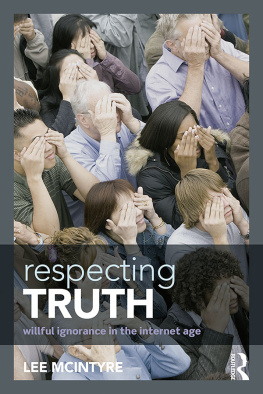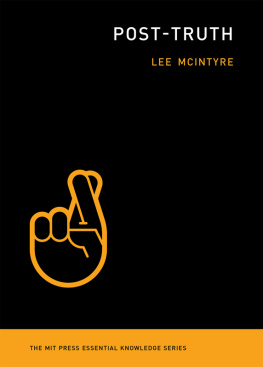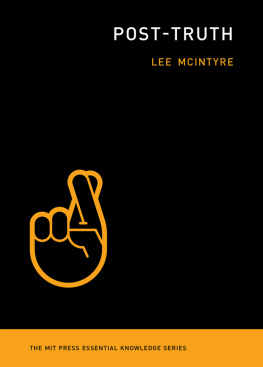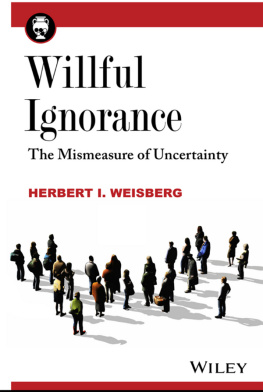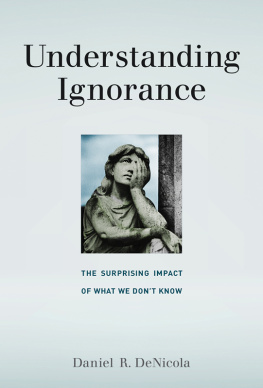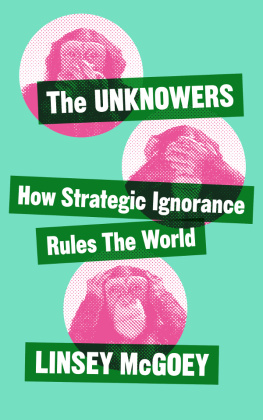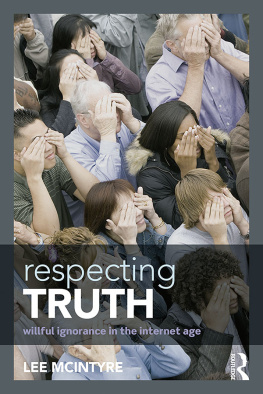RESPECTING TRUTH
Throughout history, humans have always indulged in certain irrationalities and held some fairly wrong-headed beliefs. But in his newest book, philosopher Lee McIntyre shows how weve now reached a watershed moment for ignorance in the modern era, due to the volume of misinformation, the speed with which it can be digitally disseminated, and the savvy exploitation of our cognitive weaknesses by those who wish to advance their ideological agendas. In Respecting Truth: Willful Ignorance in the Internet Age, McIntyre issues a call to fight back against this slide into the witless abyss. In the tradition of Galileo, the author champions the importance of using tested scientific methods for arriving at true beliefs, and shows how our future survival is dependent on a more widespread, reasonable world.
Lee McIntyre is a Research Fellow at the Center for Philosophy and History of Science at Boston University and author of Dark Ages: The Case for a Science of Human Behavior (2006). He is co-editor (with Alex Rosenberg) of the forthcoming Routledge Companion to Philosophy of Social Science. The author can be reached through his website at www.leemcintyrebooks.com.
Praise for this book:
Lee McIntyre identifies the central problem of truth claims todayfrom global warming and GMOs to evolution and vaccinationswillful ignorance. Respecting Truth should be read by every member of Congress before voting on legislation, and they should do so based on the facts instead of party line. The problem is group think. The solution is having a designated skeptic. I nominate Lee McIntyre.
Michael Shermer, Skeptic Magazine, USA
This is a compellingly-written book that addresses a timely issue. It is well researched, tightly constructed, and insightful. It makes for an engaging, informative and eye-opening read. The prose is light and winning, and it provides an expertly-guided tour of an issue of profound importance to us all.
Andrew Norman, Carnegie Mellon University, USA
McIntyre is very clear about the overall argumentative structure, and he provides excellent examples for each topic under discussion. Although the ideas being discussed are sometimes rather sophisticated, his exposition is very relaxed and casual.
Noretta Koertge, Indiana University, USA
RESPECTING TRUTH
Willful Ignorance in the Internet Age
Lee McIntyre

First published 2015
by Routledge
711 Third Avenue, New York, NY 10017
and by Routledge
2 Park Square, Milton Park, Abingdon, Oxon OX14 4RN
Routledge is an imprint of the Taylor & Francis Group, an informa business
2015 Taylor & Francis
The right of Lee McIntyre to be identified as author of this work has been asserted by him in accordance with sections 77 and 78 of the Copyright, Designs and Patents Act 1988.
All rights reserved. No part of this book may be reprinted or reproduced or utilised in any form or by any electronic, mechanical, or other means, now known or hereafter invented, including photocopying and recording, or in any information storage or retrieval system, without permission in writing from the publishers.
Trademark notice: Product or corporate names may be trademarks or registered trademarks, and are used only for identification and explanation without intent to infringe.
Library of Congress Cataloging in Publication Data
McIntyre, Lee C.
Respecting truth : Willful Ignorance in the Internet Age/Lee McIntyre.
pages cm
Includes bibliographical references and index.
1. Irrationalism (Philosophy) 2. Truthfulness and falsehood--Philosophy. 3. Self-deception--Philosophy. 4. Mass media--Objectivity. 5. Internet--Psychological aspects. I. Title.
B824.2.M34 2015
153.4301--dc23
2014044286
ISBN: 978-1-138-88880-7 (hbk)
ISBN: 978-1-138-88881-4 (pbk)
ISBN: 978-1-315-71316-8 (ebk)
For Rich Adelstein
who taught me to stand up for what I thought was true,
even when he disagreed with me
In times of universal deceit, telling the truth will be a revolutionary act.
George Orwell
CONTENTS
In a previous bookDark Ages: The Case for a Science of Human Behavior (MIT Press, 2006)I wrote about how ideology was corrupting the standards for evidence-based belief in the social sciences. While the natural sciences seem firmly established as the arbiter of any serious dispute about how the natural world works, in the study of human behavior many feel it reasonable to substitute wishful thinking and intuition over empirical methods. If only the social sciences could be more like the natural sciences, I lamented, we would be in a better position to understand the true causes of some of the social problems that have continued to bedevil us over the centuries, and finally be in a position to address the source of so much human misery.
But by the time I looked up, the world had changed. Science itself was under attack, even in the study of the natural world, such that some political candidates, religious leaders, media commentators (and many others who should have known better) were now disputing not only specific scientific theories that did not match their ideological prejudices, but also questioning science itself as the basis for forming true beliefs about the world. Those who believed in reason, it seemed, were being dismissed as just another interest group and science as just another ideology.
How could this have happened?
True beliefs are adaptive, right? And science works. The methods of scientific reasoning have provided us with the bounty of modern human life that is too vast to enumerate; over the last thousand years science has lifted us out of the dark ages and brought us to a world in which most of our problems are caused not by ignorance of the natural world but by our stubborn inhumanity to one another. One would think that we would suffer, therefore, if we abandoned the most successful system that the human mind has ever invented for the discovery of truth, not only about the natural world but about ourselves as well.
Yet this is exactly where so much of todays public debate has landed us. Science (and the idea of using reason as the basis for human belief in general) is routinely questioned, resisted, denied, ridiculed, rejected, and outright disrespected at the hands of those who do not wish to believe the sometimes inconvenient conclusions that are forced on us by reason. Surely there is more to truth than that which can be determined by science. Yet todaywhen we have right-wing candidates for the Presidency of the United States who dismiss the scientific evidence for human-caused global warming as a hoax and many on the left who continue to believe that there is a medical conspiracy to deny the link between childhood vaccines and autism (even after that research has been debunked)it is clear that the standards for human rationality are in trouble. For by making such blanket statementswith no credible evidence and no plausible theory about why the scientific community as a whole could get things so wrongone understands that it is the soundness of science itself that is being questioned.
Of course, even though many may doubt particular scientific theories, they also understand at some level that we cannot do without science. They may question evolution or global warming when it suits their gut or their politics, but then without irony turn around and use Twitter or their iPhone to spread their medieval opinions. Captured by a benighted ideology, millions may wish to row away from science and reason when it is convenient, but they also want to keep the shoreline in sight.
Next page
